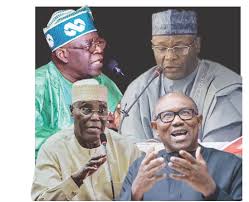Presidential Election Dispute and Politics of 25% Votes in FCT by Idris Umar Feta
POLITICS DIGEST- Some few months ago, the 2023 general elections were held, with various political leaders emerging in the process.
When the Independent National Electoral Commission, INEC, declared President Bola Ahmed Tinubu as winner of the Presidential election, it ignored the fact that 25% of the votes cast in FCT must also be secured to win, together with the two-third of the 36 States.
But according to some experts, one thing to be considered is that the FCT is not a state, and that is why some sections of the constitution have addressed that.
Section 134 (1) and (2) of the 1999 Constitution of Nigeria (as amended) stipulates that a presidential candidate must attain or score a majority of votes cast in a presidential election, where two or more candidates are involved, and at least 25% in two-third of the 36 states and Federal Capital Territory (FCT) of Nigeria to meet the constitutional requirement to be declared as duly elected as President of Nigeria.
Since Nigeria has 36 states and the FCT, Abuja, a presidential candidate is required to score a simple majority of votes and at least 25 per cent votes in 24 States plus the FCT.
The role it plays in section 134(2) is merely to add the FCT, Abuja to the number of States in Nigeria, so that a candidate would be aware that he or she must gets up to 25 per cent of the votes cast in each of 2/3, not just of 36 States, but of “the 36 States and Abuja” which is 37 States.
Below is a peep of what prominent Lawyers have said about getting 25% of votes before a candidate can be declared winner:
*Femi Falana, SAN*
The Senior Advocate of Nigeria (SAN), Femi Falana argued that according to the provisions of Section 299(1) of the Constitution, the Federal Capital Territory shall be treated as if it were one of the states of the Federation. It means that, the FCT is the 37th State.
Read Also:
Also, Section 134 of the Constitution of the Federal Republic of Nigeria provides that “not less than one-quarter of the votes cast at the election in each of at least two-thirds of All the States and the FCT” means 25 States or 24 States plus the FCT. “Winning the FCT by a candidate is not compulsory.”
Thus, by the combined effect of Sections 134 and 299 of the Constitution, a candidate shall be deemed to have won the Presidential election if he scores the highest number of lawful votes cast at the election, and 25% of lawful votes in 37 States or 36 States plus the FCT. It is not compulsory, for a Presidential candidate to win the FCT. Thus, FCT according to him “is not the Electoral College of the Federal Republic of Nigeria.”
*Barrister Rotimi George*
For Barrister Rotimi, scoring 25% in the FCT is not compulsory before a presidential candidate can be declared winner.
“The legal practitioner while reacting to Bola Tinubu’s victory brouhaha, further noted that such condition must be satisfied according to the Nigerian law and it is not excusable.
“Even though the Federal Capital Territory, Abuja (FCT) is not a State properly so called, the Constitution has clothed it with the toga of a State. In other words, the FCT is treated like a State, and all the powers of a Governor in a State are vested in the Minister of the FCT. While the Houses of Assembly of the 36 States of the Federation legislate for each State respectively, the National Assembly makes laws for the FCT. Furthermore, while the States have their respective Local Government Areas, the FCT has Area Councils.”
In pursuant to the above, Section 299 of the Constitution expressly provides that the provisions of the Constitution shall apply to the Federal Capital Territory, Abuja as if it were one of the States of the Federation. Section 299 of the Constitution has received the judicial imprimatur of the full panel of the Supreme Court.
In conclusion, a candidate who secures the highest number of votes cast and also has at least 25 percent in 25 States of the Federation does not need a 25 per cent in the FCT as condition to be declared winner in consideration of the fact the FCT was not treated as separate entity by the constitution.

















